Unit 4 Body language- learning lanuage(广东省广州市)
文档属性
| 名称 | Unit 4 Body language- learning lanuage(广东省广州市) |
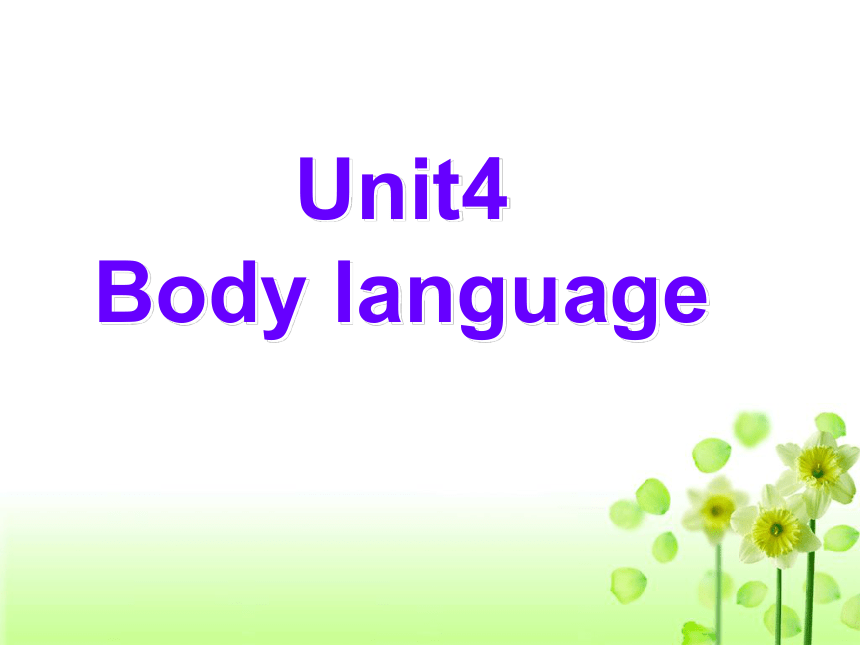
|
|
| 格式 | rar | ||
| 文件大小 | 276.1KB | ||
| 资源类型 | 教案 | ||
| 版本资源 | 人教版(新课程标准) | ||
| 科目 | 英语 | ||
| 更新时间 | 2007-10-15 00:00:00 | ||
图片预览


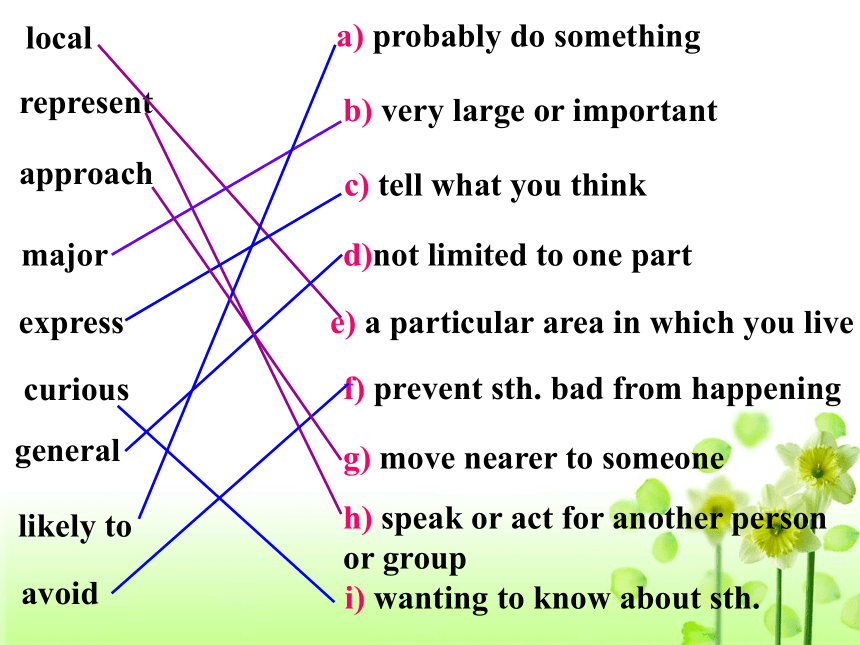


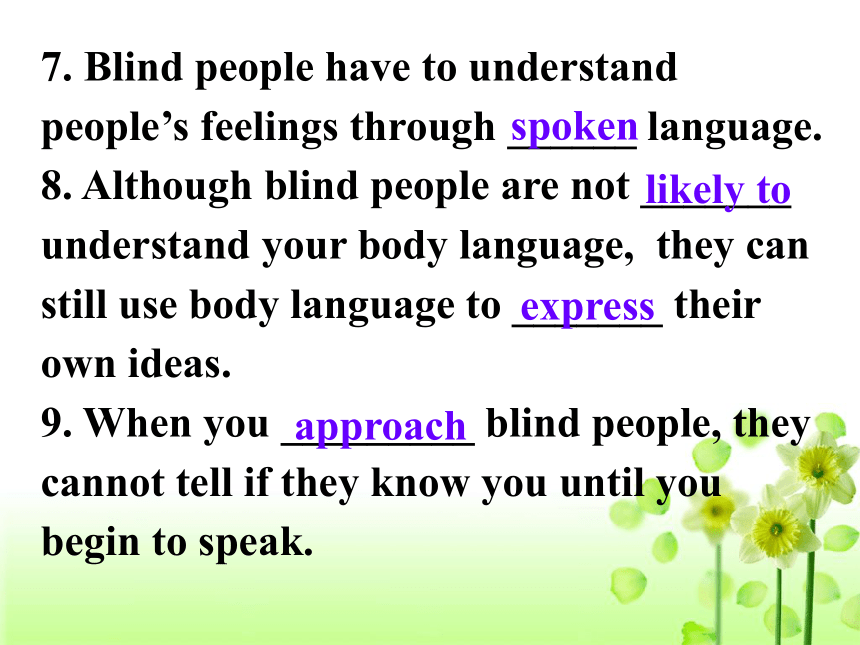
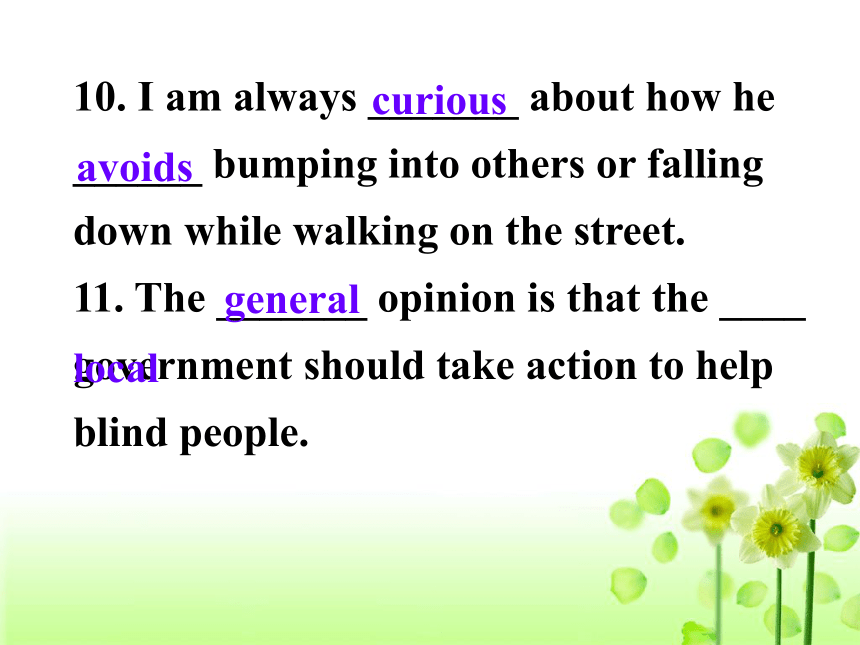
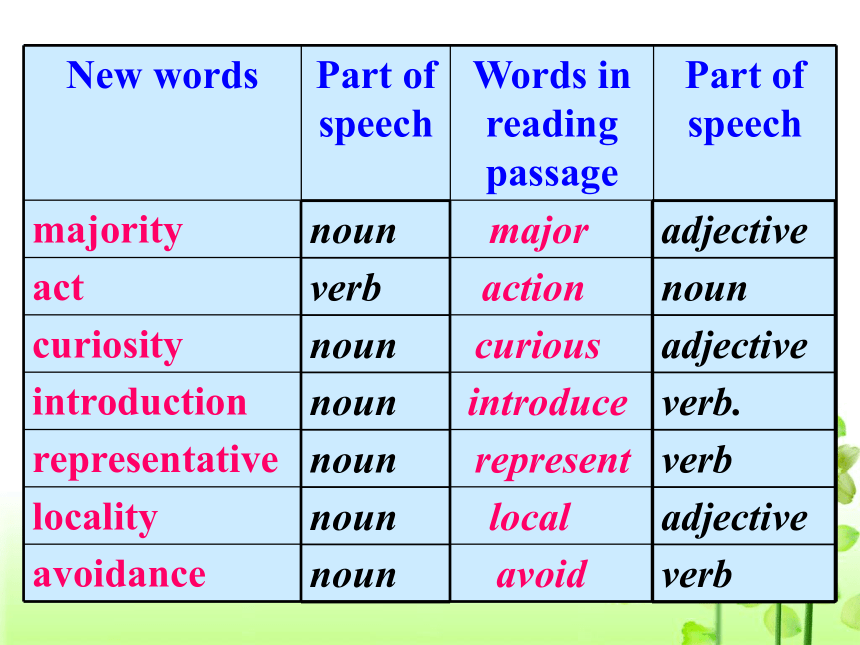

文档简介
课件28张PPT。Unit4
Body languagemajor adj. 较多的,主要的 local adj. 本地的,地方的 represent vt. 做为------的代表/ 象征/curious adj. 好奇的,求知的
introduce vt. 介绍,引进 approach vt. 靠近,接近 ; 方法touch vt. 触摸,接触,触及,轻触
stranger n. 陌生人
spoken adj. 口头的,口语的 express vt. 表达,表示(感情,意见)be likely to do sth. 很可能…,有希望…
nod 点头general adj. 普遍的,全面的;一般的,大体的。avoid vt. 避开,避免localrepresentapproachmajorexpresscuriousgenerallikely toavoida) probably do somethingb) very large or importantc) tell what you thinkd)not limited to one parte) a particular area in which you livef) prevent sth. bad from happeningg) move nearer to someoneh) speak or act for another person or group i) wanting to know about sth.Fill in the blanks with proper words. 1. It is a ______ problem parking your car in Beijing.
2. Is that Wang Li’s friend from Wuxi? I’d like him to _________ her to me .
3. As my English vocabulary is very limited, very often I express my meaning with the help of _____________.majorintroducebody language4. In _______, it is better not to kiss somebody you don’t know as you may surprise them.
5. My leader wants me to _________ her at the meeting.
6. There is a saying that _______ speak louder than words.generalrepresentactions7. Blind people have to understand people’s feelings through ______ language.
8. Although blind people are not _______ understand your body language, they can still use body language to _______ their own ideas.
9. When you _________ blind people, they cannot tell if they know you until you begin to speak.spokenlikely toexpressapproach10. I am always _______ about how he ______ bumping into others or falling down while walking on the street.
11. The _______ opinion is that the ____ government should take action to help blind people. curiousavoidsgenerallocalmajoractioncuriousintroducerepresentlocalavoid现在分词作定语,当分词单独做定语时,放在所修饰的名词前;如果是分词短语做定语放在名词后。
In the following years he worked even harder.
在后来的几年中,他学习更努力了。
The man speaking to the teacher is our monitor's father.
正与老师谈话的那个人是我们班长的父亲。现在分词--定语Practice:
____ dogs seldom bite.
Bark B. To bark C. Barked D. Barking
(2) The wolf spoke in a _____ voice and Mr. Dongguo felt______.
frightening; frightened
B. frightened; frightened
C. frighten; frightening
D. frightening; frighteningDA(3) It’s pleasure to watch the face of a ____ baby.
asleep B. sleep C. sleeping D. slept
(4) The ____ buildings showed us that an earthquake was coming.
A. shaking B. shook C. shaken D. shake CA现在分词在语法功能上相当于动词、形容词或副词。现在分词通常和逻辑主语之间存在主动关系。但要注意其各种形式变化:主动形式 被动形式
V-ing being V-ed
having V-ed having been V-ed 一般式完成式Hearing the bell, the students began to enter the classroom. 听见铃声,学生们开始走进教室。(听见和进入两个动作同时发生)
The building being built now is our new library. 现在正在建造地 这栋楼房室我们地 新图书馆(being built为现在分词的被动形式,表示动作正在进行之中。)Having done the work, he went home. 完成了工作,他就回家了。现在分词作状语现在分词作状语往往和逻辑主语之间存在主动关系。现在分词作状语,常常用来表示原因、时间、方式、结果、条件、伴随状况等。现在分词一般不用作表目的地状语(通常用不定式表目的地状语)。Walking in the street, I came across an old friend of mine.
(=When I was walking in the street, I came across an old friend of mine.)While waiting for the bus, he read a copy of China Daily.
(=While he was waiting for the bus,he read a copy of China Daily.)1)表时间状语2) 表原因状语
Being ill, he didn’t go to school.
(=as he was ill, he didn’t go to school.)Being a student, you should study hard.
(=Since you are a student, you should study hard.)Thinking he might be at home, I called him.
(As I thought he might be at home, I called him.) 3)表方式、伴随情况地状语 :作伴随状语地分词表示的动作,必须是主语的一个 动作,或是与谓语所表示地动作(或状态)同时发生,或是对谓语表示地动词(或状态)作进一步地补充说明。Eg. He sat on the sofa, watching TV.
(=He sat on the sofa, and watched TV.)他们笑着谈着走进了教室。_____________________ , they went into the classroom.他斜靠(lean)着墙站着。He stood leaning against the wall.
(=He stood and leaned against the wall.)Laughing and talking4) 表结果
Eg. Her mother died in 1990, leaving her with her younger brother.
(=Her mother died in 1990, and left her with her younger brother.)全国到处在传唱这首歌曲,使它成了一首最受欢迎地歌曲。The song is sung all over the country,______________________________.making it the most popular song5)表条件Using your head, you will find a way.
(=If you use your head, you will find a way.)一直往前走,你就会看到一座白色地房子。______________, you will see a white house.Walking ahead(6)与逻辑主语构成独立主格:
I waiting for the bus, a bird fell on my head.
我等汽车时,一只鸟落到我头上。
All the tickets having been sold out, they went away disappointedly.
所有的票已经卖光了,他们失望地离开了。
Time permitting, we'll do another two exercises.
如果时间允许,我们将做另两个练习。
with (without) +名词(代词宾格)+分词形式
With the lights burning, he fell asleep.
他点着灯睡着了。
(7)作独立成分:
Judging from(by) his appearance, he must be
an actor.
从外表看,他一定是个演员。Practise:
They set out ____ for the ____ boy.
searching; losing B. searching; lost
C. to search; lost D. searched; losing
(2) The student sat there, ____ what to do.
doesn’t knowing B. didn’t knowing
C. not know D. not knowingBD(3)He sat there _____ , with his head on his hand.
and think B. thinking
C. thought D. being thought
(4) The ____ Prime Minister expressed his satisfaction with his talks, ___ that he had enjoyed his stay here.
visiting; add B. visited; adding
C. visiting; adding D. visited; addedBCThe secretary worked late into the night, _____a long speech for the president.(MET91)
To prepare B. preparing C. prepared D. was preparing
2.European foot ball is played in 80 countries, ______ it the most popular sport in the world.(NMET 98)
Making B. makes C. made D. to makeB现在分词表结果状语A 现在分词作伴随状语高考链接3. “Can’t you read?” Mary said _______ to the notice. (MET93)
A. angrily pointing B. and point angrily
C. angrily point D. and angrily pointingA现在分词作伴随状语4. ____ a reply, he decided to write again.(MET92)
Not receiving B. Receiving not
C. Not having received D. Having not received
5.______ his telephone number, she had some difficulty getting in touch with Bill.(上海91年题)
Not knowing B. knowing not
C. Not having known D. Having not knownCA现在分词作原因状语,分词结构种否定词通常放在现在分词前面。作原因状语Homework:Finish the the ex. 3 and the exercise in Using structures.
Body languagemajor adj. 较多的,主要的 local adj. 本地的,地方的 represent vt. 做为------的代表/ 象征/curious adj. 好奇的,求知的
introduce vt. 介绍,引进 approach vt. 靠近,接近 ; 方法touch vt. 触摸,接触,触及,轻触
stranger n. 陌生人
spoken adj. 口头的,口语的 express vt. 表达,表示(感情,意见)be likely to do sth. 很可能…,有希望…
nod 点头general adj. 普遍的,全面的;一般的,大体的。avoid vt. 避开,避免localrepresentapproachmajorexpresscuriousgenerallikely toavoida) probably do somethingb) very large or importantc) tell what you thinkd)not limited to one parte) a particular area in which you livef) prevent sth. bad from happeningg) move nearer to someoneh) speak or act for another person or group i) wanting to know about sth.Fill in the blanks with proper words. 1. It is a ______ problem parking your car in Beijing.
2. Is that Wang Li’s friend from Wuxi? I’d like him to _________ her to me .
3. As my English vocabulary is very limited, very often I express my meaning with the help of _____________.majorintroducebody language4. In _______, it is better not to kiss somebody you don’t know as you may surprise them.
5. My leader wants me to _________ her at the meeting.
6. There is a saying that _______ speak louder than words.generalrepresentactions7. Blind people have to understand people’s feelings through ______ language.
8. Although blind people are not _______ understand your body language, they can still use body language to _______ their own ideas.
9. When you _________ blind people, they cannot tell if they know you until you begin to speak.spokenlikely toexpressapproach10. I am always _______ about how he ______ bumping into others or falling down while walking on the street.
11. The _______ opinion is that the ____ government should take action to help blind people. curiousavoidsgenerallocalmajoractioncuriousintroducerepresentlocalavoid现在分词作定语,当分词单独做定语时,放在所修饰的名词前;如果是分词短语做定语放在名词后。
In the following years he worked even harder.
在后来的几年中,他学习更努力了。
The man speaking to the teacher is our monitor's father.
正与老师谈话的那个人是我们班长的父亲。现在分词--定语Practice:
____ dogs seldom bite.
Bark B. To bark C. Barked D. Barking
(2) The wolf spoke in a _____ voice and Mr. Dongguo felt______.
frightening; frightened
B. frightened; frightened
C. frighten; frightening
D. frightening; frighteningDA(3) It’s pleasure to watch the face of a ____ baby.
asleep B. sleep C. sleeping D. slept
(4) The ____ buildings showed us that an earthquake was coming.
A. shaking B. shook C. shaken D. shake CA现在分词在语法功能上相当于动词、形容词或副词。现在分词通常和逻辑主语之间存在主动关系。但要注意其各种形式变化:主动形式 被动形式
V-ing being V-ed
having V-ed having been V-ed 一般式完成式Hearing the bell, the students began to enter the classroom. 听见铃声,学生们开始走进教室。(听见和进入两个动作同时发生)
The building being built now is our new library. 现在正在建造地 这栋楼房室我们地 新图书馆(being built为现在分词的被动形式,表示动作正在进行之中。)Having done the work, he went home. 完成了工作,他就回家了。现在分词作状语现在分词作状语往往和逻辑主语之间存在主动关系。现在分词作状语,常常用来表示原因、时间、方式、结果、条件、伴随状况等。现在分词一般不用作表目的地状语(通常用不定式表目的地状语)。Walking in the street, I came across an old friend of mine.
(=When I was walking in the street, I came across an old friend of mine.)While waiting for the bus, he read a copy of China Daily.
(=While he was waiting for the bus,he read a copy of China Daily.)1)表时间状语2) 表原因状语
Being ill, he didn’t go to school.
(=as he was ill, he didn’t go to school.)Being a student, you should study hard.
(=Since you are a student, you should study hard.)Thinking he might be at home, I called him.
(As I thought he might be at home, I called him.) 3)表方式、伴随情况地状语 :作伴随状语地分词表示的动作,必须是主语的一个 动作,或是与谓语所表示地动作(或状态)同时发生,或是对谓语表示地动词(或状态)作进一步地补充说明。Eg. He sat on the sofa, watching TV.
(=He sat on the sofa, and watched TV.)他们笑着谈着走进了教室。_____________________ , they went into the classroom.他斜靠(lean)着墙站着。He stood leaning against the wall.
(=He stood and leaned against the wall.)Laughing and talking4) 表结果
Eg. Her mother died in 1990, leaving her with her younger brother.
(=Her mother died in 1990, and left her with her younger brother.)全国到处在传唱这首歌曲,使它成了一首最受欢迎地歌曲。The song is sung all over the country,______________________________.making it the most popular song5)表条件Using your head, you will find a way.
(=If you use your head, you will find a way.)一直往前走,你就会看到一座白色地房子。______________, you will see a white house.Walking ahead(6)与逻辑主语构成独立主格:
I waiting for the bus, a bird fell on my head.
我等汽车时,一只鸟落到我头上。
All the tickets having been sold out, they went away disappointedly.
所有的票已经卖光了,他们失望地离开了。
Time permitting, we'll do another two exercises.
如果时间允许,我们将做另两个练习。
with (without) +名词(代词宾格)+分词形式
With the lights burning, he fell asleep.
他点着灯睡着了。
(7)作独立成分:
Judging from(by) his appearance, he must be
an actor.
从外表看,他一定是个演员。Practise:
They set out ____ for the ____ boy.
searching; losing B. searching; lost
C. to search; lost D. searched; losing
(2) The student sat there, ____ what to do.
doesn’t knowing B. didn’t knowing
C. not know D. not knowingBD(3)He sat there _____ , with his head on his hand.
and think B. thinking
C. thought D. being thought
(4) The ____ Prime Minister expressed his satisfaction with his talks, ___ that he had enjoyed his stay here.
visiting; add B. visited; adding
C. visiting; adding D. visited; addedBCThe secretary worked late into the night, _____a long speech for the president.(MET91)
To prepare B. preparing C. prepared D. was preparing
2.European foot ball is played in 80 countries, ______ it the most popular sport in the world.(NMET 98)
Making B. makes C. made D. to makeB现在分词表结果状语A 现在分词作伴随状语高考链接3. “Can’t you read?” Mary said _______ to the notice. (MET93)
A. angrily pointing B. and point angrily
C. angrily point D. and angrily pointingA现在分词作伴随状语4. ____ a reply, he decided to write again.(MET92)
Not receiving B. Receiving not
C. Not having received D. Having not received
5.______ his telephone number, she had some difficulty getting in touch with Bill.(上海91年题)
Not knowing B. knowing not
C. Not having known D. Having not knownCA现在分词作原因状语,分词结构种否定词通常放在现在分词前面。作原因状语Homework:Finish the the ex. 3 and the exercise in Using structures.
同课章节目录
